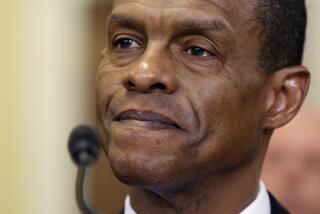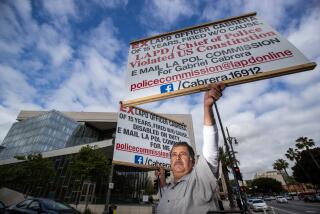Brutalizing the Have-Nots
- Share via
West Los Angeles resident Tracy Grayson, a 33-year-old defense attorney, attended a recent protest near the LAPD’s downtown headquarters against police brutality. He participated in the demonstration to commemorate the 10th anniversary of the death of his brother, Todd Grayson, who died shortly after a sheriff’s deputy shot him in November 1990.
ERICA ZEITLIN spoke with Tracy Grayson about police and their role.
*
The root cause of police violence is economic, as is the source of so much else in this society. You have the haves and the have-nots, and essentially, the police exist to keep the haves from losing what they have.
I don’t think they are conscious of it, but the reality is that you don’t see [incidents of police brutality] happening in wealthy neighborhoods.
When I went to court about a traffic ticket, the judge, who was black, actually made the argument that laws are socially indiscriminate. But based on the appearance of all the defendants I saw there, well, none of them were in suits. And I may be making some assumptions, but based on what I saw there, I was thinking, “Then how come there are no rich people in here?”
I read a book in college on police repression in urban America [and it referred to police as] the “protectors of privilege.” That is the job of the police and I think they just don’t have [as much] respect for people of color and are just quicker to pull that trigger. These things don’t happen in Beverly Hills or Pacific Palisades.
In the case of my brother, he was out with friends--all of them African Americans--in this motel room and circumstances were very strange, but the police claimed that my brother had a gun, and that he reached for it, and they shot him. I have no idea to this day what happened. But after they shot him, they let him lie there and bleed to death, and one of them said, “It’s all in a day’s work.”
I think people who get into these [law enforcement] organizations just eventually go with the flow. It makes no difference if they are black officers. It’s an institution and they want to fit in. In a society that is based on racism, violence is inherent in what police do. They operate with guns and billy clubs, so it’s not a great leap to pulling that trigger, because you already have it in your hand. It can’t be coincidental that this happens. Can you imagine them shooting a little white girl 12 times like they did little Tyisha Miller [a black teenager shot by four white officers two years ago]. That’s part of the racism in this society.
I can tell you from my experience in the D.A.’s office, when I wore regular clothes, they just assumed that I was the defendant [and] they talked down to me.
More to Read
Sign up for Essential California
The most important California stories and recommendations in your inbox every morning.
You may occasionally receive promotional content from the Los Angeles Times.










